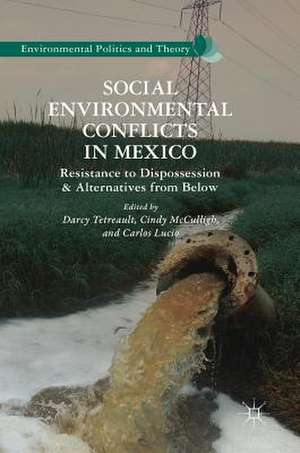Social Environmental Conflicts in Mexico: Resistance to Dispossession and Alternatives from Below: Environmental Politics and Theory
Editat de Darcy Tetreault, Cindy McCulligh, Carlos Lucioen Limba Engleză Hardback – 21 mar 2018
Toate formatele și edițiile
| Toate formatele și edițiile | Preț | Express |
|---|---|---|
| Paperback (1) | 639.41 lei 6-8 săpt. | |
| Springer International Publishing – 11 ian 2019 | 639.41 lei 6-8 săpt. | |
| Hardback (1) | 649.87 lei 6-8 săpt. | |
| Springer International Publishing – 21 mar 2018 | 649.87 lei 6-8 săpt. |
Preț: 649.87 lei
Preț vechi: 764.55 lei
-15% Nou
Puncte Express: 975
Preț estimativ în valută:
124.35€ • 135.50$ • 104.79£
124.35€ • 135.50$ • 104.79£
Carte tipărită la comandă
Livrare economică 23 aprilie-07 mai
Preluare comenzi: 021 569.72.76
Specificații
ISBN-13: 9783319739441
ISBN-10: 3319739441
Pagini: 283
Ilustrații: XXIII, 303 p. 8 illus., 4 illus. in color.
Dimensiuni: 148 x 210 mm
Greutate: 0.68 kg
Ediția:1st ed. 2018
Editura: Springer International Publishing
Colecția Palgrave Macmillan
Seria Environmental Politics and Theory
Locul publicării:Cham, Switzerland
ISBN-10: 3319739441
Pagini: 283
Ilustrații: XXIII, 303 p. 8 illus., 4 illus. in color.
Dimensiuni: 148 x 210 mm
Greutate: 0.68 kg
Ediția:1st ed. 2018
Editura: Springer International Publishing
Colecția Palgrave Macmillan
Seria Environmental Politics and Theory
Locul publicării:Cham, Switzerland
Cuprins
1. An Introduction to Social Environmental Conflicts and Alternatives in Mexico.- 2. Energy Privatization and Land Grabbing: The Scope and Contradictions of the Mexican Neoliberal Oil Mega-Initiative.- 3. Winds of Resistance in the Isthmus of Tehuantepec.- 4. Political Class Formation in Opposition to the Zapotillo Dam.- 5. The Grey Side of Green Growth: Environmental Regulation and the Industrial Pollution of the Santiago River.- 6. Water in Zacatecas: A Crisis without Conflict.- 7. Thermal Waters, Ecotourism and Indigenous Community in the Mezquital Valley of Hidalgo.- 8. Traditional Mezcal Production in Zapotitlán de Vadillo.- 9. Taking Stock of Contestation and Alternatives to Neoliberal Capitalism in Mexico.
Notă biografică
Darcy Tetreault is Professor in the Department of Development Studies at the Autonomous University of Zacatecas, Mexico, and Adjunct Professor of International Development Studies at Saint Mary’s University, Halifax, CA.
Cindy McCulligh is Associate Researcher in the Consortium for Research and Dialogue on Local Government (CIDIGLO) at the Center for Research and Advanced Studies in Social Anthropology (CIESAS), Mexico, and an adviser for the Colectivo Ecologista Jalisco, Mexico.
Carlos Lucio is Professor Researcher at the Autonomous University of Chapingo, Mexico, at the regional center in Morelia, Michoacán.
Cindy McCulligh is Associate Researcher in the Consortium for Research and Dialogue on Local Government (CIDIGLO) at the Center for Research and Advanced Studies in Social Anthropology (CIESAS), Mexico, and an adviser for the Colectivo Ecologista Jalisco, Mexico.
Carlos Lucio is Professor Researcher at the Autonomous University of Chapingo, Mexico, at the regional center in Morelia, Michoacán.
Textul de pe ultima copertă
What are the political economic conditions that have given rise to increasing numbers of social environmental conflicts in Mexico? Why do these conflicts arise in some local and regional contexts and not in others? How are social environmental movements constructed and sustained? And what are the alternatives? These are the questions that this book seeks to address. It is organized into three parts. The first provides a panoramic view of social environmental conflicts in Mexico and of alternatives that are being constructed from below in rural areas. It also provides an analysis of the recent reforms to open the country’s energy sector to private and foreign investment. The second is comprised of local-level case studies of conflict (and no conflict) in diverse geographic locations and cultural settings, particularly in relation to the construction of wind farms, hydraulic infrastructure, industrial water pollution, and groundwater overdraft. The third explores alternatives from belowin the form of community-based ecotourism and traditional mezcal production. A concluding chapter engages comparative and global analysis.
Caracteristici
Broaches subjects pertinent to critical development studies, Mexican and Latin American studies, political economy, environmental studies, sociology and social anthropology Is one of the first projects on the topic written in English Provides empirical research findings and theoretical discussions oriented to students, academics, and social activists














